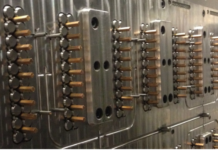When a business sells physical products, they either have to outsource manufacturing or keep it in-house. The benefits of outsourcing manufacturing are pretty obvious – reduced labor, start-of-the-art technology, and increased efficiency, which is exactly why Mexico’s consumer electronics manufacturers are seeing unprecedented growth as more and more companies choose to work with them and utilize these benefits. However, in-house manufacturing also comes with an impressive list of benefits. Here are the benefits of becoming an in-house manufacturer.
In-house manufacturing, particularly for industrial mixing, presents a compelling array of advantages that businesses find instrumental in their operations. One of the primary benefits is the enhanced control and oversight over the entire production process. When a company manufactures its products in-house, it has direct management over the quality of materials, production timelines, and overall product consistency.
Easier communication
One of the most obvious benefits is easy communication. When manufacturing is kept in-house, it’s easy to keep a clear and constant line of communication open between all business departments. For example, if the marketing team needs some information about a product for its launch, they can go straight to the manufacturing department. This simply wouldn’t be feasible with an outsourced manufacturer. In fact, they would probably only have one contact within the company, and getting information could take weeks.
Agility and the ability to react to the market quickly
When you keep manufacturing in-house, you can react quicker than your competitors. For example, if there is a sudden demand for a new type of product, you can begin manufacturing almost immediately, beating your competitors to market. This is a huge advantage in fast-paced industries.
Cost-effectiveness and no minimums
One of the biggest challenges when working with outsourced manufacturers is minimum runs. A manufacturer might have a minimum run of 10,000 products, which means you can’t test the market without a significant investment in stock. If you keep manufacturing in-house, you can reduce the minimum runs significantly. This can make it more cost-effective for businesses with large product lines, and may free up more funds to invest in equipment for industrial mixing, as an example, or whichever areas of the business would benefit the most from a boost.
Rapid testing and new iterations of prototypes
Getting a product right isn’t always easy. Sometimes, it requires a large investment of time and resources in the prototyping stage. With an in-house manufacturing department, you can test products and try out new prototypes rapidly. This makes finding the final product considerably quicker.
Increased productivity and efficiency
It is often argued that outsourcing manufacturing will lead to an increase in productivity and efficiency. However, that isn’t necessarily the case. Sure, it might lead to a short-term increase, thanks to the business processes of the manufacturer. However, over the long term, it’s better to keep manufacturing in-house. It gives the business greater control over productivity and efficiency, which should lead to a larger increase over time. For example, with an in-house manufacturing department, you could look at improving the quality of conveyor belts with fluentconveyors.com, which could increase the speed of production.
Easy customization
When working with an outsourced manufacturer, it’s not always easy to customize products. This again goes back to the idea of minimum runs. If you want to create a slightly different version of a product to test the market, you will need to order a large number to meet the minimum run requirements. In-house manufacturing makes it considerably easier to customize products.
Intellectual and physical property protection
One of the biggest risks associated with manufacturing is the protection of intellectual and physical property rights. When you send designs to a manufacturer, you are increasing the risk of that design being copied or stolen by a competitor. In-house manufacturing allows you to keep intellectual and physical property protected.


















